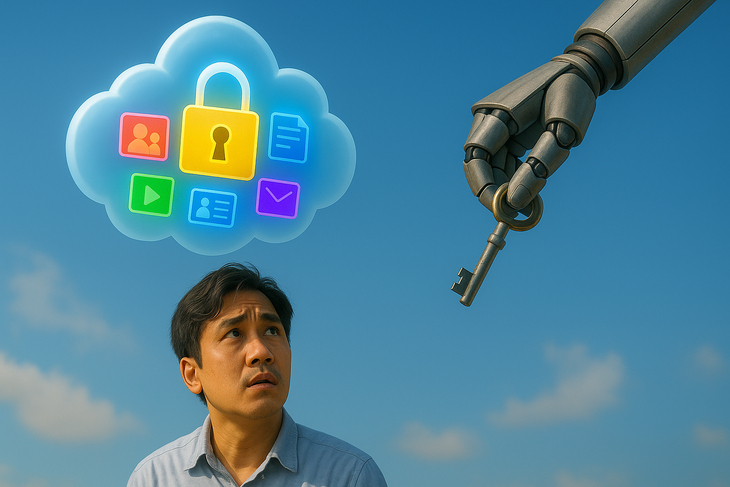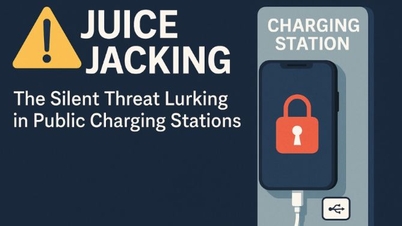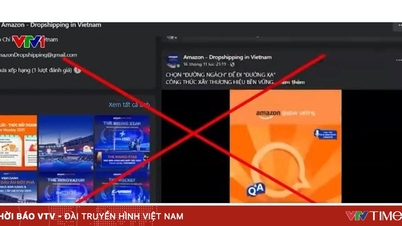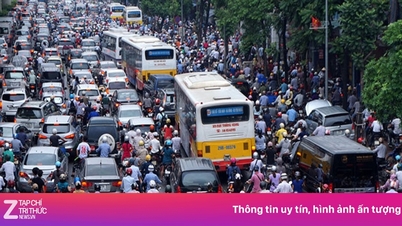
Users create data, but access depends on the platform - Illustration photo
In theory, most major cloud platforms claim that users retain ownership of the content they upload. The terms of service (TOS) of companies like Google, Apple, and Microsoft all state clearly: “Users retain full ownership of their data.” However, nominal ownership does not mean users have full control over that data.
In reality, access, retention, and even use of data are subject to technical conditions and policies from the service provider. Once an account is locked, restricted due to policy violations (even if unintentional), or simply when the platform stops providing services, users can completely lose access to the data they created.
The cloud is not a safe and you don't hold the key.
Many people have lost everything when their cloud accounts were suddenly locked due to being flagged for content violations. Data was frozen, access was blocked, and everything stored from family photos to work records suddenly disappeared without a trace.
The truth is: when you store in the cloud, you’re renting space from a provider, and they have the keys to that “data warehouse.” You can access it when things are going well, but you can’t open the door yourself if the other party decides to close it.
Even worse, in some legal cases, your data can be accessed or shared with third parties without your knowledge. That's the line between "nominal ownership" and "loss of actual control."
Internal or external cloud: Who holds the power of data?
In Vietnam, using cloud is no longer a personal choice, but has become a default trend in life and work. However, the majority of market share still belongs to foreign services such as Google, Microsoft or Amazon Web Services.
Domestic cloud platforms such as VNPT Cloud, Viettel Cloud or VNG Cloud are developing rapidly in terms of infrastructure, but still have difficulty building a competitive enough ecosystem and attracting the trust of individual users.
Meanwhile, legal regulations such as the Law on Cyber Security or Decree 13/2023 on personal data protection have clearly stated the responsibility to store important data domestically. But one question remains: are individual users really protected and in control of their data?
Reality shows that most users simply believe that "what's mine is mine to keep", without anticipating the situation of having access to their own digital assets cut off.
Data is no longer on personal devices, not independently encrypted, and has no backup copies. These are three critical weaknesses in the current digital era. And it is worth mentioning that it is not always the user's fault. A small change in the algorithm, a change in policy, or an automated action from the system can completely block access to data, without any debate or "trial".
Data today is more than just information, it is memory, effort, identity, and power. But in the digital world , that power is being held by many without them even realizing it, until they are denied access to their very assets.
The convenience of the cloud is undeniable, but because it is so easy, it makes us forget the limitations and potential risks. In the era of "living in the cloud", don't let the most important things fly out of your hands just because of subjectivity.
How to keep data safe when using the cloud
- Always have a backup copy: Don't just save it on the cloud, save it on a USB or hard drive as well.
- Protect private files with password: Use WinRAR, PDF or available software to encrypt.
- Prioritize cloud services with servers located in Vietnam: Like VNPT Cloud, Viettel Cloud, easy to support when there is a problem.
- Enable two-factor authentication (2FA): Helps protect your account if your password is exposed.
- Read the terms of use carefully: Know what rights you have over your data.
Source: https://tuoitre.vn/du-lieu-tren-cloud-ban-co-that-su-quan-ly-2025071115145279.htm














































































































Comment (0)